
Rudy Giuliani, the lawyer and former Republican mayor of New York who has been amplifying misinformation to Republican President Donald Trump, has more than just one favorite online conspiracy. His obsession with the utterly unfounded theory that Democrats colluded with Ukrainian nationals to delegitimize Trump's 2016 presidential win is only Giuliani's latest flight of fancy. It is predated by another that is equally ridiculous: that a 78-year-old Muslim cleric named Fethullah Gülen used a global network of followers to conspire with Hillary Clinton to influence the 2016 presidential campaign.
At one point in 2017, according to the Washington Post, senior administration officials asked Giuliani specifically not to bring up Turkish issues — like Gülen’s status in the US — when he met with Trump. Giuliani’s Turkish “hobby horse,” as one former official described it, is far from a random international political figure, though. Gülen is an important node in a tangled web of far-right paranoia. Giuliani told BuzzFeed News that he has never pushed for Gülen's extradition, even though the Washington Post reported otherwise. Nevertheless, understanding why Giuliani was so obsessed with him means understanding how state-sponsored Turkish trolls were able to hijack American right-wing media in 2016 — and may do so again this time around.
As we saw with the way doubts about a cybersecurity firm hired by Democrats in 2016 evolved into an unfounded global criminal conspiracy, these ideas can take form in strange ways, but typically follow a pattern. They start in an anonymous community, which may have been infiltrated by state actors, where the narrative develops in fits and starts. It’s then aggregated by viral news publishers, who transmit a refined version of the narrative back to the community (as well as amplifying it to a bigger audience), who mutates it further.
Here’s how, between 2016 and 2017, this all fell into place around an obscure Turkish cleric.
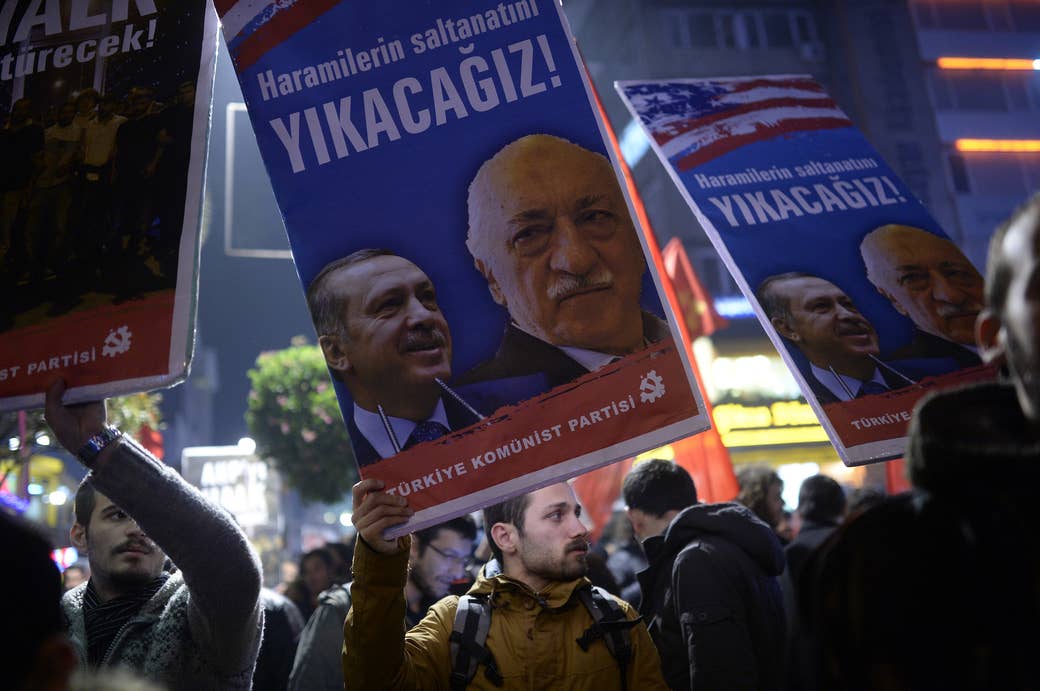
Gülen, born in 1941, is a moderate imam and longtime anti-communist. He’s the founder of the Gülen movement (or “hizmet,” which means “service” in Turkish), a volunteer network focused on a religiously tolerant form of Sunni Islam that follows the work of Said Nursi, a theologian and political opponent of the founder of the modern Turkish state Mustafa Kemal Ataturk. Gülen’s followers have founded schools around the world, which are largely private and Muslim-run. Many of Gülen’s followers took jobs in the Turkish state’s security or civil services, despite their leader having lived in exile in Pennsylvania since 1999. Gülen and his followers were previously aligned with Recep Tayyip Erdogan, who had been elected to prime minister in 2003 promising a “clean hands" government dedicated to rooting out corruption. A 2013 corruption scandal, however, led to the split between Erdogan and Gülen, after Erdogan’s Justice and Development Party was embroiled in the investigation. Cabinet ministers resigned, Erdogan claimed the investigation was a coup attempt, ordered the removal of hundreds of police officers — many of which were Gülenites — and accused Gülen of orchestrating the whole plot to undermine the country.
Three years later, Erdogan’s government accused Gülen of working with the American intelligence community to foment the 2016 coup attempt. For those who want to look for reasons to think Gülen and the CIA have worked together in the past, examples abound. According to a memoir by a top former Turkish intelligence official, Gülen's schools in Central Asia provided cover for the CIA. When Gülen needed a green card in 1999, a former CIA official and the former American ambassador to Turkey helped him get one. And after the failed 2016 coup, Turkey issued an arrest warrant for that former CIA official who sponsored Gülen's green card on charges of attempting to overthrow the Turkish government.
Because of Gülen’s international influence, he has been a lesser-known right-wing bogeyman in the United States for years, but he — and his extremely tenuous connections to Bill and Hillary Clinton — didn’t really catch the eye of right-wing media until the lead-up to the 2016 election.
The most likely reason he was on Giuliani’s radar in 2017 was WikiLeaks.
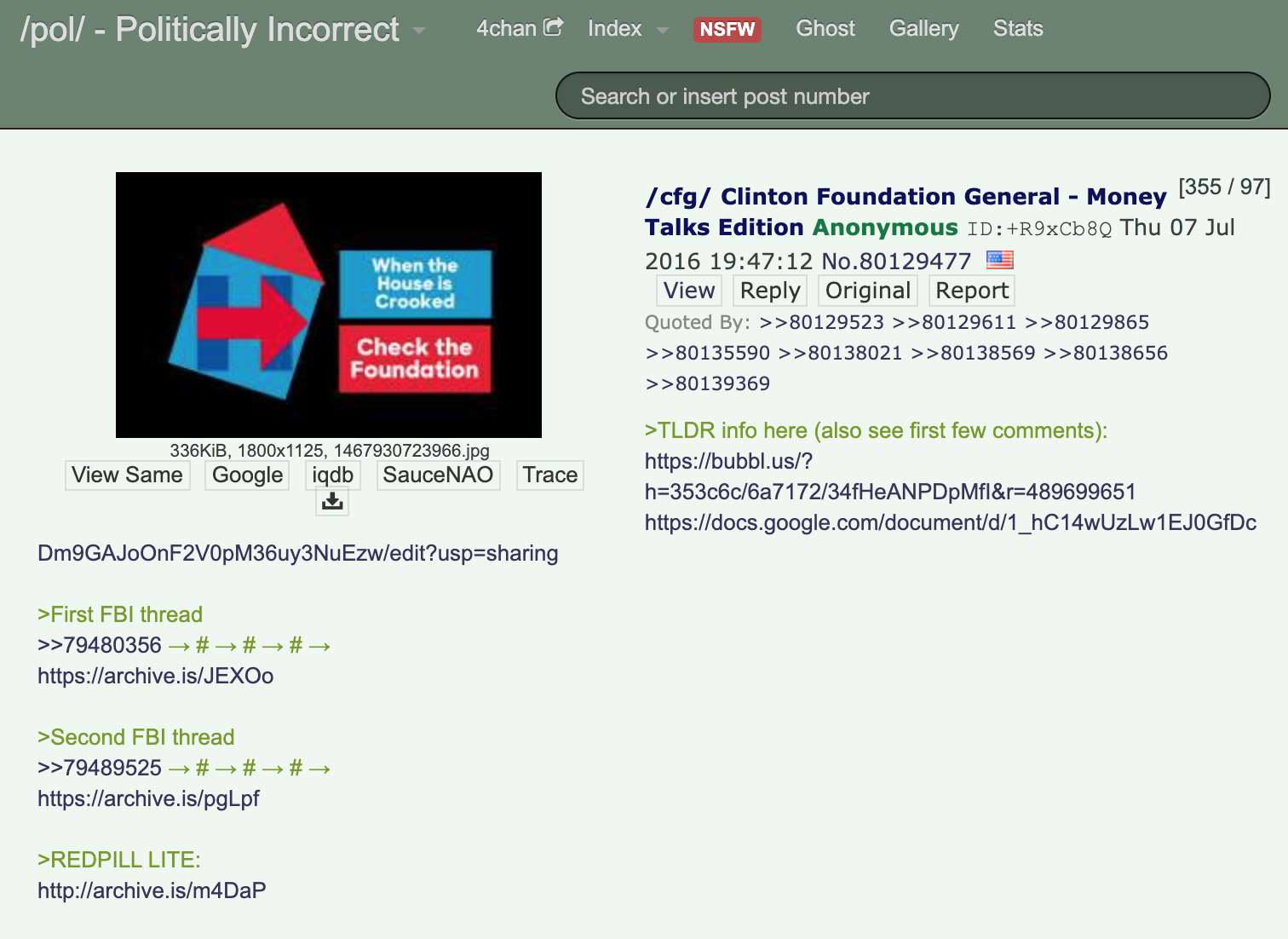
Between June and July 2016, Russian hackers began releasing DNC email leaks under the name DNCLeaks, which were then collected and packaged by WikiLeaks. The emails quickly spread across websites like Reddit and 4chan. Gülen’s name first appeared in a July 7, 2016, 4chan thread titled “Clinton Foundation General — Money Talks Edition,” according to 4plebs, an incomplete archive of 4chan posts.
“Y'all niggas heard of Fethullah Gulen? The leader of a muslim movement in Turkey. He's living in a CIA-funded compound in Turkey, funds terrorist attacks in Turkey, has been extradited by Erdogan, oh and he's got a whole bunch of charter schools in the US — THAT THE FBI HAVE RAIDED,” a user writes in the thread. “I'll get to the Clinton part.”
The user then links to a 2012 article in City Journal, a publication of the right-wing Manhattan Institute think tank, which details how members of the Gülen movement run one of America’s largest charter school networks, and how the cleric had been praised by former Democratic president Bill Clinton.
“You are contributing to the promotion and the ideals of tolerance and interfaith dialogue, inspired by Fethullah Gülen and his transnational social movement,” the former president said at the Turkish Cultural Center’s Third Annual Friendship Dinner in 2008. “You are truly strengthening the fabric of our common humanity."
The user also links to a story on Glenn Beck’s right-wing news site the Blaze titled “How a Turkish Cleric’s Network Has Penetrated the Clinton Campaign and American Education,” which accused the Gülen movement of being “a combination of cult, cabal and corporation" that “appears to be busy buying, using and abusing political power.”
“Saved all of this holy fuck,” another user replies.
It’s likely that users would have forgotten about Gülen, except that on July 15, 2016 — a week after the cleric first seems to have appeared on 4chan — a faction within the Turkish armed forces attempted a coup. Erdogan defeated the uprising and blamed Gülen and his followers, demanding the US extradite the cleric. According to a European Council on Foreign Relations report, there was enough evidence to link Gülenites to the coup attempt, but little evidence pointing to Gülen himself. The US declined to turn over Gülen, who continues to live in a compound in Pennsylvania's Pocono Mountains.
News of the coup ignited 4chan: “Something just doesn't make sense here. If the military were supposed to be the good guy secularists, trying to take out Erdogan for making the country more Islamic and oppressing the people,” one user writes. “Why would the people fight against the military and why did the military kill civilians?”
Gülen is mentioned all over the thread. Users with Turkish IP addresses flooded the comments, directing people to an Erdogan “redpill" thread, which portrays Gülen as a Muslim fundamentalist scheming to overthrow the secular Erdogan government.
“Erdogan is Islam Lite. He sincerely gets votes in fair elections,” one user posting from a Turkish IP address writes in the thread. “Gulen is Islam Heavy. He is a fucking imam.”
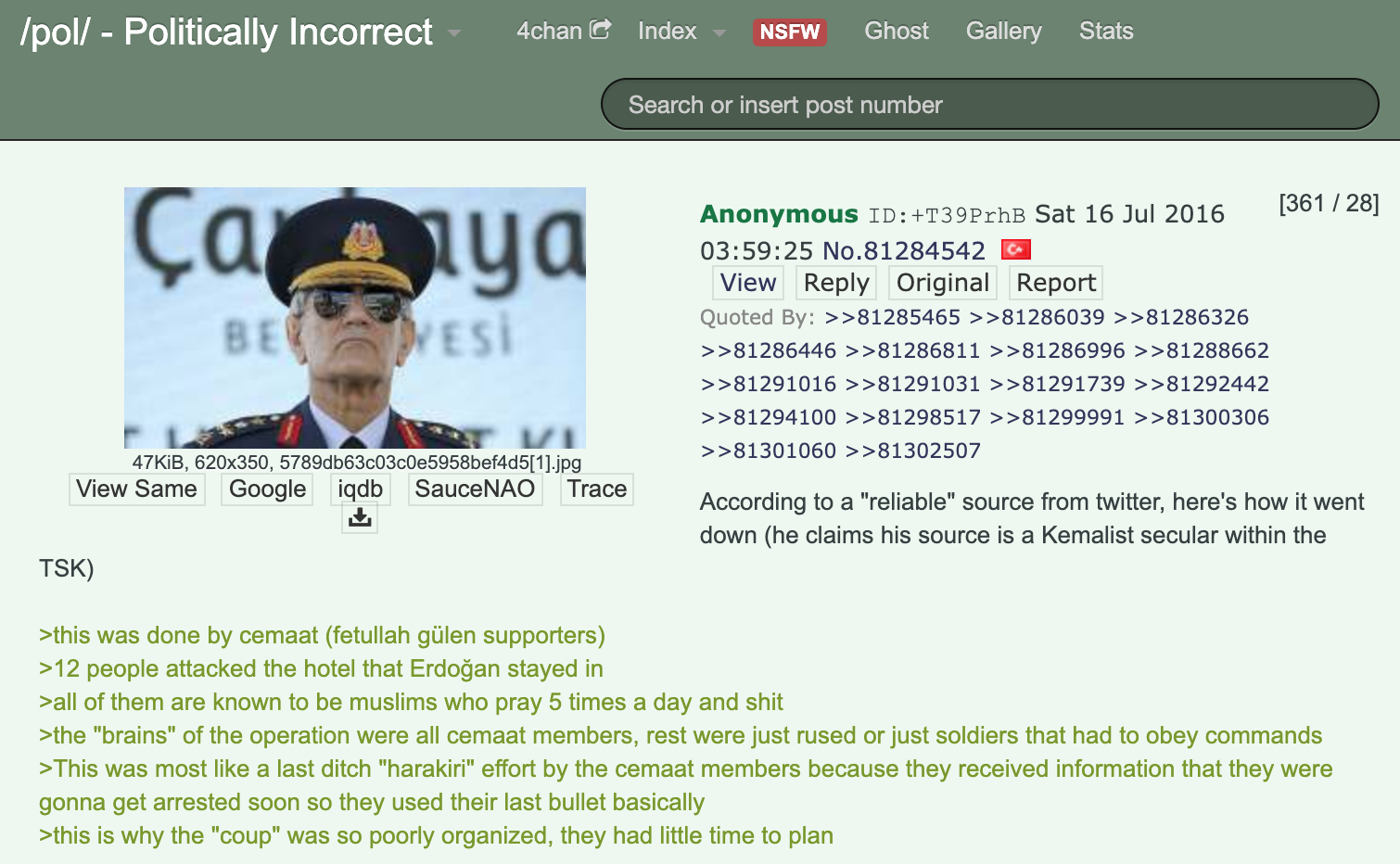
At the time, it was extremely likely that AK-Trolls, a group of internet commenters directly funded by the Turkish state and working for the youth wing of Erdogan’s Justice and Development Party, were brigading 4chan, using anonymous communities to plant a false narrative that would later blossom at conservative news outlets like Breitbart. Following the 2016 coup, Gülen and his movement were one of their main targets. According to research on the Justice and Development Party’s troll program, their main focus is creating a personality cult of Erdogan as the “tall man under constant attack" by spreading the idea of a “New Turkey” that is under attack by supporters of “Old Turkey.”
So, in July 2016, as 4chan was swarming with AK-Trolls, WikiLeaks decided to collect DNCLeaks into two big drops, the first of which came on July 22, 2016, providing a traffic bonanza for conservative publishers popular on Facebook. Suddenly, all the rambling discourse online about Clinton and the Democrats was legitimized by the fact that a supposedly on-the-level organization like WikiLeaks had picked up the documents. Gülen’s name appears in an email from April 2016, included in the DNC email dump, which references “direct media outreach related to" Gülen. WikiLeaks tweeted four times about Gülen in July 2016, using the hashtag #TurkeyCoup and accusing Hillary Clinton and the CIA of organizing the coup.
All of this inspired conservative American media to zero in on the tightly anti-Gülen narrative, which was then bolstered in AK-troll-ridden spaces like 4chan and Twitter. The Daily Caller was particularly aggressive about reporting it, as was Breitbart, which went so far as to call his movement a cult.
Daily Caller reporter Chuck Ross started looking into the Gülen movement’s donations to the Clinton campaign a year before the coup attempt. He told BuzzFeed News it seemed like an interesting story.
“There were a lot of political donations from Gülenites,” Ross said. “It was kind of clear that all these donations and political activity there was something going on.”
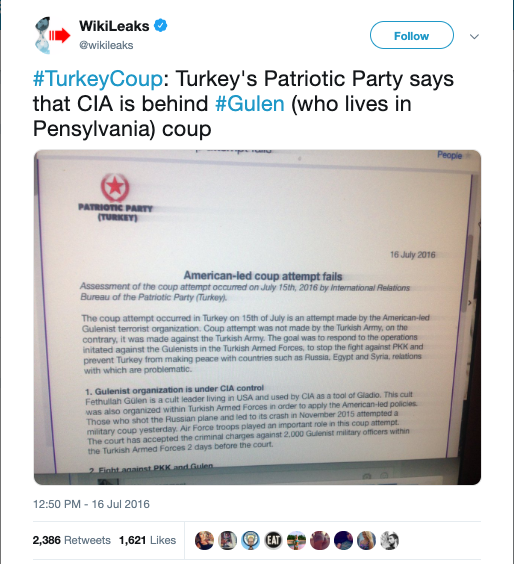
He said he didn't notice any troll activity or Twitter activity after his initial pieces, but it did pick up considerably afterwards. In July 2016, WikiLeaks dropped 294,548 emails it said were leaked from the AKP. Ross and his articles were named in some of the emails.
“In those emails a lot of these people close to Erdogan are linking to my articles about Gulen,” he said. “One of the guys made it sound like they were involved with the story.”
Erdogan’s advisors trying to pass off Ross’ genuine reporting on Gülen as propaganda — which it very much wasn't — set off a free-for-all on social media. He was praised by legions of AK-trolls on Twitter and viciously attacked by Gülenites who thought he was a pro-Erdogan plant.
"I was on both sides in a sense of that story,” he said.
Their point of view is roughly this: There’s a religious network running a huge predominantly Muslim charter school network across America, which drew the praise of Bill Clinton. An Istanbul college professor and Gülenite, Adil Öksüz, who was accused by the Turkish government of helping coordinate the 2016 failed coup attempt, donated $5,000 to the Ready for Hillary PAC in 2014. Another Gülenite, founder of the Turkish Cultural Center, Gökhan Özkök, served as national finance cochair of the pro-Clinton Ready PAC. A Gülen-aligned group called the Alliance for Shared Values hired the Podesta Group to lobby Congress on its behalf. It’s all supposed to add up to Gülen and his movement infiltrating the Democratic Party. All of that must mean something is going on.
Russian media was also obsessed with Gülen. Russian state broadcaster RT produced a five-part documentary series on the cleric and his movement, and wrote stories in 2016 linking both the Turkish coup and Gülen to the FBI, the CIA, and NATO. At the time of the failed coup, another Russian state news agency, Sputnik News, published a story calling Gülen the “White House's trump card against Turkey.”
By October 2016, taking the bait, Redditors were blaming both Hillary Clinton and Hungarian American investor and philanthropist George Soros for the Arab Spring and the 2016 coup attempt in Turkey. By November 2016, AK-Trolls had succeeded in rebranding Gülen as “Turkish Stalin" on 4chan.
On Election Day, Nov. 8, 2016, former national security adviser Michael Flynn, who at the time was working for Trump’s presidential campaign, wrote an opinion piece for the Hill, accusing Gülen of running “a vast global network" that had “all the right markings to fit the description of a dangerous sleeper terror network." At the time, Flynn did not disclose that he was receiving funds from a private company to lobby for the interests of the Turkish government, according to lobbying forms Flynn filed retroactively. But Flynn went much further than just writing about Gülen. According to former CIA director James Woolsey, during the previous summer, Flynn had met with Turkish officials in a New York hotel and discussed abducting the cleric and spiriting him back to Turkey.
Flynn resigned from the Trump administration in February 2017, after it was discovered he had misled the FBI about his communications with Russian Ambassador Sergey Kislyak. A month after Flynn’s resignation, on March 11, 2017, then–attorney general Jeff Sessions fired Preet Bharara, the US attorney for the Southern District of New York. Bharara had just enough of a connection to Gülen to be exciting to Trump trolls.
A year before Bharara’s firing, in March 2016, an indictment was unsealed in the Southern District of New York against Iranian Turkish gold trader Reza Zarrab. Bharara, the prosecutor for the case, became a hero to average Turks tired of corruption. Zarrab had been exonerated by Turkish officials in 2013 on charges of aiding in a scheme to use gold to buy Iranian oil and gas during the corruption scandal that created the schism between Erdogan and Gülen.
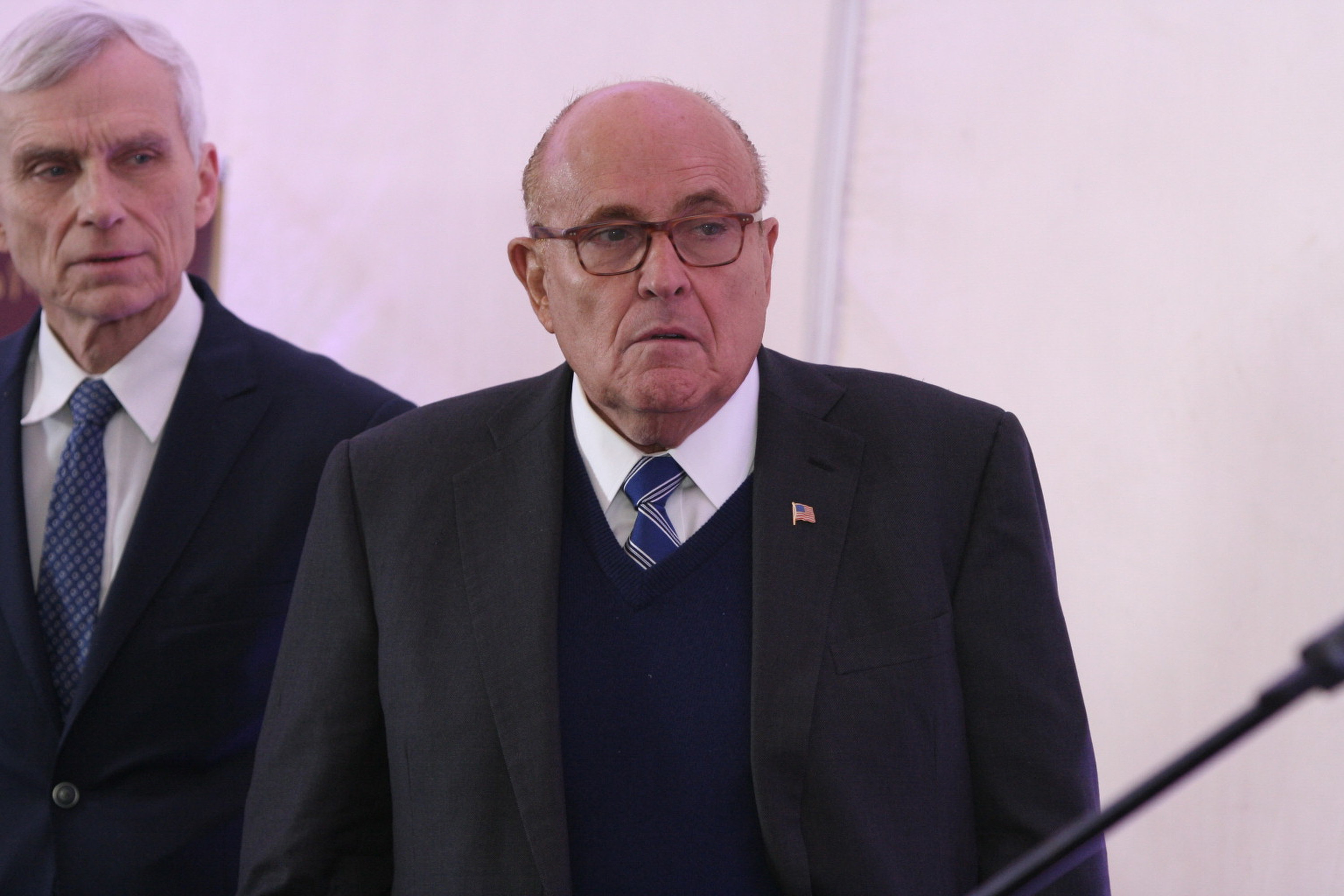
During the spring of 2017, Flynn’s resignation, Bharara’s firing, and lingering rumors about the Gülen movement drove right-wing media attention around Turkey. “Would like some anons to dig into Gülen and find out who he is with and why we allow him to operate here,” a user on 4chan wrote following Flynn’s resignation.
But 4chan users didn’t have to dig deeply into Gülen — because Giuliani appears to have done the shoveling for them. The country became a pet project for the former mayor. Giuliani, who legally represented Zarrab, was quoted by Fox News as looking for a "diplomatic solution" to resolving the charges against his client. Giuliani would then attempt to stop Bharara’s prosecution of Zarrab in the fall of 2017, by pressing former secretary of state Rex Tillerson. Tillerson refused.
First, Giuliani began publicly pushing pro-Erdogan policies on Fox News. As the year progressed, Giuliani began having private conversations with White House officials about Gülen. One White House official said that Giuliani was pushing the extradition of Gülen so aggressively, President Trump began to actually consider doing it.
Giuliani’s obsession with Gülen was apparently a genuine source of confusion for those around him. He reportedly began referring to the cleric as a “dangerous extremist,” language ripped straight from far-right message boards and hyperpartisan media.
Giuliani, as always, has denied any wrongdoing. In a conversation with BuzzFeed News, Giuliani called the claim that he advocated for Gülen's extradition ridiculous. He said in 2017 he was representing Zarrab, and attempting to negotiate a prisoner exchange with Turkey to free Andrew Brunson, an American pastor who was arrested during the 2016 coup.
“If I had been advocating for the extradition of Gülen, it would have taken the place my client was going to occupy. Let's call it the trade date for Pastor Brunson. That is absolutely nuts," Giuliani told BuzzFeed News.
And he’s told reporters he’s not a lobbyist and isn’t being paid by Turkey to push policy matters. That may be true. It’s much cheaper and much easier to anonymously spread bullshit across social media and wait for him to fall for it.
